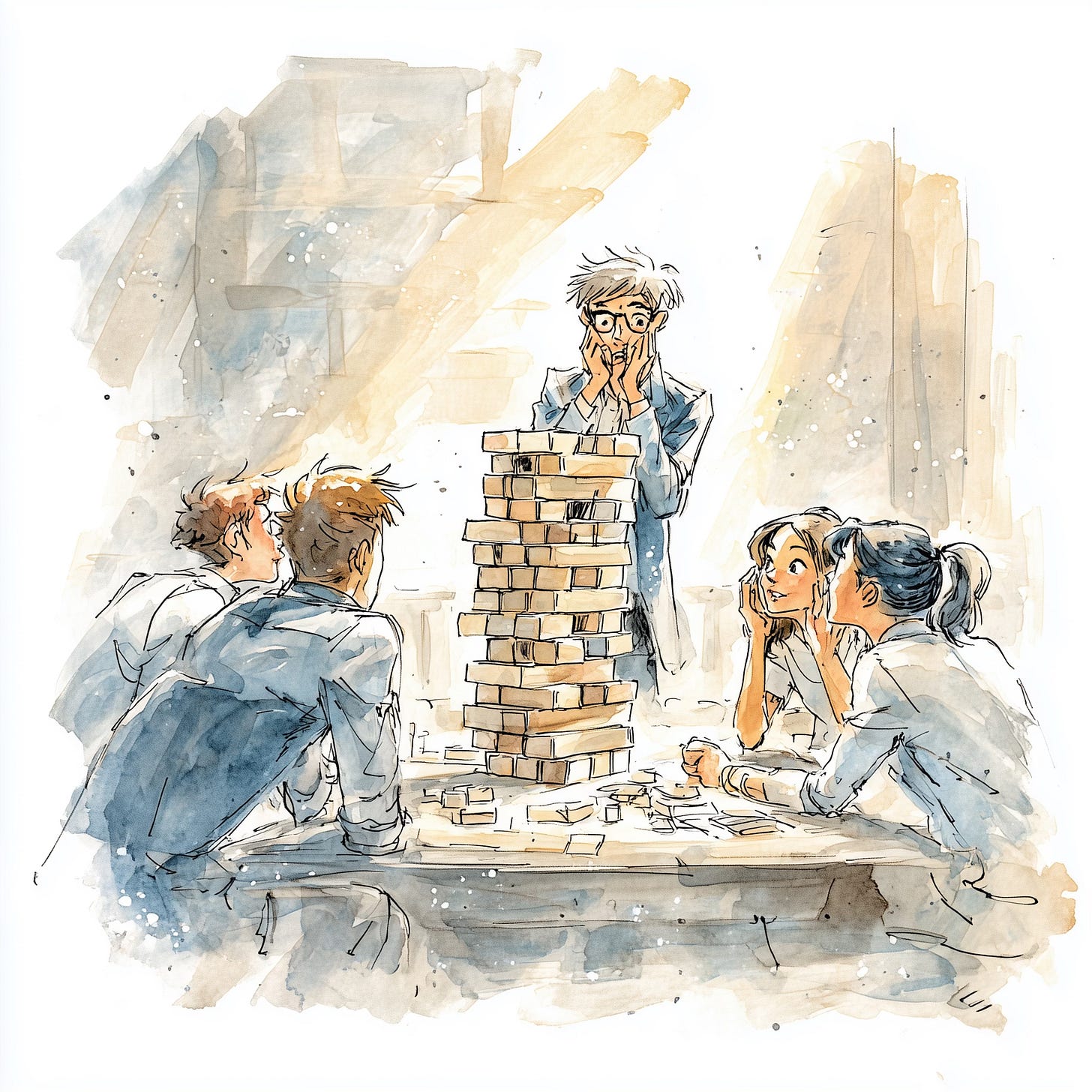Rule Number One: Never Say That to Yourself
The Language of Performance
It happened during a simple game of Jenga. The tower stood there — tall, nervous, one wrong move away from collapse. As one of our friends approached for their turn, they laughed and said, “I’m so bad at this!” And sure enough, the tower came crashing down seconds later.
Everyone laughed, of course. It was just a game. But I told them — half in jest, half in earnest — “Rule number one in life: never say that to yourself! Language is important. We all believe in you more than you believe in yourself.”
That line got a chuckle, but underneath it sits one of the most powerful truths in psychology and performance science: the way we speak to ourselves shapes how we show up in the world.
We think of words as light and inconsequential, but in performance science, words have mass. They alter focus, confidence, and even physiology. Psychologists have found that negative self-talk directly reduces performance, not because it changes skill, but because it hijacks the brain’s attention. Say “I’m terrible at this” before taking a shot, and your body obliges — tightening muscles, splitting focus, fulfilling the prophecy.
Athletes and performers use language as leverage. They replace “I can’t” with “let’s see what happens.” They speak to themselves like great coaches, not critics. Albert Bandura called this self-efficacy — the belief that your actions can create change. Without it, even talent falters. With it, almost anything becomes possible.
And this doesn’t just happen in our own heads. The Pygmalion effect shows that when others express belief in us, it measurably boosts our performance. Telling your anxious Jenga partner, “We all believe in you,” isn’t just kind — it rewrites their mental script. Belief is contagious. Whether you think you can or you can’t, as people believe Henry Ford said, you’re right.
How You Do One Thing Is How You Do Everything
I have a personal mantra: how you do one thing is how you do everything.
When someone approaches a small challenge like Jenga with a nervous laugh and a preemptive apology, that’s not just a game habit — it’s a mindset leaking through. The way we handle trivial moments mirrors how we handle real ones. Do we meet uncertainty with curiosity or apology? Do we step forward saying, “Let’s see what happens,” or retreat whispering, “I’m bad at this”?
If you practice calm focus and positive self-talk in low-stakes moments, you’re wiring your brain for high-stakes resilience. Every game, every tiny test, is practice for composure.
The Stoics understood this deeply. Their rule was simple: focus only on what you can control. In Jenga, that’s your hand, your breath, your focus — not whether the tower falls. Accepting that there is no “right” outcome dissolves pressure. You stop fearing failure, and paradoxically, you perform better.
Modern psychology echoes this. Focusing on process instead of outcome lowers anxiety and improves results. When you stop trying to control what you can’t, you free up energy to excel where you can. As Epictetus might say, “Do your best. Let happen what may.”
The most consistent performers, whether athletes or executives, treat small acts as sacred practice. When you approach even a game with presence, calm, and integrity, you’re rehearsing your mindset for everything else. Each time you refuse to say “I’m bad at this,” you’re building a habit of self-trust that transcends circumstance.
Getting Out of Your Own Way
At the heart of it all lies a concept called flow — that state where you perform at your best, time dissolves, and thought gives way to presence. You can’t reach flow by thinking “don’t mess up.” Flow requires silence of mind.
That’s why Stoic focus and positive self-talk aren’t just nice ideas; they’re the prerequisites for peak performance. Flow can’t exist in the same room as self-criticism. When your inner dialogue gets out of the way, your body and intuition take over.
Rafael Nadal embodies this truth. “Down match point”, he doesn’t dwell on the score. He’s present — one breath, one serve, one point at a time. That’s how comebacks happen: not from panic, but from poise.
To cultivate that same poise, start with awareness. When you hear yourself say “I can’t,” pause and reframe. Replace judgment with process — “I’m learning.” Focus on what’s controllable: your breath, your next move. Detach from the outcome. Visualize success, not as fantasy, but as memory. And when pressure rises, take three slow breaths and remind yourself: If it falls, it falls. I’m still fine.
Games like Jenga are metaphors for life. The goal isn’t to keep the tower standing forever; it’s to stay balanced as it wobbles. The real victory isn’t when the tower stands — it’s when your mindset does.
So next time you face a shaky tower — literal or otherwise — remember: don’t declare defeat before you begin. Believe in your steady hand. Never say, “I’m bad at this.” Because you’re not. You’re just one block away from better.






